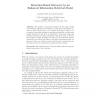253 search results - page 8 / 51 » How Can Computer Science Contribute to Knowledge Discovery |
110
click to vote
DIS
2007
Springer
15 years 9 months ago
2007
Springer
The massive, ever-growing literature in life science makes it increasingly difficult for individuals to grasp all the information relevant to their interests. Since even experts’...
107
click to vote
HICSS
2008
IEEE
15 years 9 months ago
2008
IEEE
This paper investigates the relationship between student role-behavior and position in a Social Network and the processes of creating sustained collaborative knowledge building in...
136
click to vote
ACMDIS
1997
ACM
15 years 7 months ago
1997
ACM
Human-computer interaction is multidisciplinary, drawing paradigms and techniques from both the natural sciences and the design disciplines. HCI cannot be considered a pure natura...
163
click to vote
PREMI
2007
Springer
15 years 9 months ago
2007
Springer
The rapid expansion of the Internet has resulted not only in the ever-growing amount of data stored therein, but also in the burgeoning complexity of the concepts and phenomena per...
119
click to vote
CSE
2009
IEEE
15 years 9 months ago
2009
IEEE
—The hidden knowledge in social networks data can be regarded as an important resource for criminal investigations which can help finding the structure and organization of a crim...

